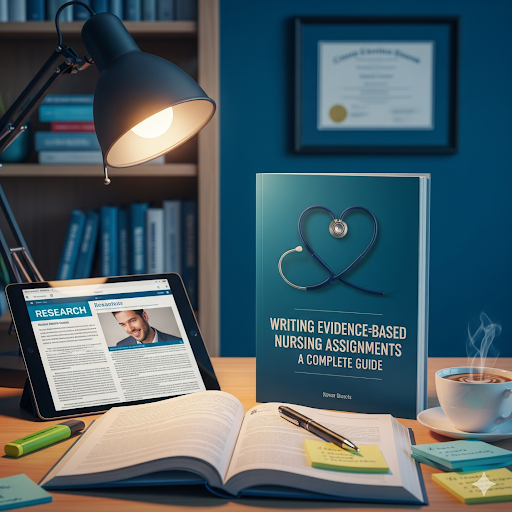Nursing education in Australia places a strong emphasis on developing both clinical and academic skills. Among the many tasks students face, evidence-based nursing assignments hold a unique place because they require more than just memorising textbook knowledge. These assignments test critical thinking, research skills, and the ability to apply evidence-based practices to real-life healthcare situations. For students, producing a well-structured paper that integrates scientific evidence and nursing theory is not just a university requirement it is also a step toward becoming a competent healthcare professional.
Understanding Evidence-Based Nursing Assignments
Evidence-based practice (EBP) is the backbone of modern nursing. It combines clinical expertise, patient preferences, and the best available research evidence to make healthcare decisions. When students are asked to write evidence-based assignments, they are essentially being trained to adopt this approach in their academic work.
An evidence-based nursing assignment requires students to:
- Identify a healthcare problem or scenario.
- Research relevant studies, clinical guidelines, or scholarly articles.
- Critically analyse and apply this evidence to the situation.
- Present findings in a logical and well-structured manner.
Unlike traditional assignments that might rely on general theories, evidence-based tasks demand the integration of current, peer-reviewed research
Why Evidence-Based Assignments Are Important
For Australian nursing students, evidence-based assignments are more than academic exercises. They serve several purposes:
- They encourage critical thinking and analytical reasoning.
- They help students connect theory to practice, preparing them for clinical placements.
- They ensure students are familiar with current healthcare research and professional guidelines.
- They contribute to improved patient care outcomes by fostering a culture of evidence-driven practice.
When done correctly, these assignments strengthen a student’s confidence in applying knowledge to real-world nursing challenges.
Key Steps in Writing an Evidence-Based Nursing Assignment
Writing a strong evidence-based assignment involves several steps. Below is a structured approach tailored for Australian university students.
Choosing the Right Topic
Select a topic that is relevant to your coursework and clinical practice. For example, you might explore the effectiveness of wound care techniques, pain management strategies, or infection control protocols. A focused topic makes it easier to locate reliable research.
Conducting Thorough Research
Use academic databases such as PubMed, CINAHL, and Google Scholar to find peer-reviewed journal articles, clinical guidelines, and systematic reviews. Australian students are often expected to follow the Australian Health Practitioner Regulation Agency (AHPRA) standards and reference credible sources like the Joanna Briggs Institute.
Evaluating Evidence
Not all research is of equal quality. Critical appraisal is essential. Students should assess the reliability, validity, and applicability of each study. This process ensures that the evidence used is both trustworthy and relevant to nursing practice.
Structuring the Assignment
A clear structure is key to communicating ideas effectively. Most evidence-based nursing assignments follow a pattern:
- Introduction: Define the topic, outline objectives, and explain the significance of the issue.
- Literature Review: Summarise key findings from existing research.
- Critical Analysis: Compare and contrast evidence, highlighting strengths and limitations.
- Application to Practice: Discuss how the findings can be applied in clinical settings.
- Conclusion: Summarise the main points and suggest recommendations for practice.
Referencing and Academic Integrity
Australian universities are strict about plagiarism. Always reference your sources correctly, usually in APA or Harvard style. Proper citations not only give credit to original authors but also strengthen the credibility of your work.
Common Challenges Students Face
Even the most dedicated students often find evidence-based nursing assignments difficult. Common challenges include:
- Limited understanding of research methods and statistical data.
- Difficulty in critically evaluating complex journal articles.
- Struggles with structuring arguments in a logical flow.
- Time management issues due to multiple assignments and clinical placements.
These challenges explain why many students turn to nursing assignment help services. With professional guidance, they can improve their research, writing, and referencing skills while meeting strict deadlines.
Benefits of Professional Support
Seeking evidence based nursing assignment help does not mean students lack ability it means they value guidance. Expert support can provide:
- Access to academic professionals with backgrounds in nursing and healthcare.
- Well-structured assignments that meet university requirements.
- Clarification of difficult concepts, making learning easier.
- Confidence in submitting plagiarism-free and high-quality work.
Tips for Success in Evidence-Based Nursing Assignments
- Start early to allow enough time for research and revisions.
- Take notes while reading journal articles to avoid missing key points.
- Use clear, academic language and avoid unnecessary jargon.
- Always link evidence back to patient care and nursing practice.
- Seek feedback from professors or peers before final submission.
Conclusion
For students who find themselves struggling with workload, research, or time constraints, professional nursing assignment help offers the support needed to succeed. By also considering evidence based nursing assignment help, students in Australia can ensure that their academic work not only meets university expectations but also strengthens their foundation for clinical practice.

